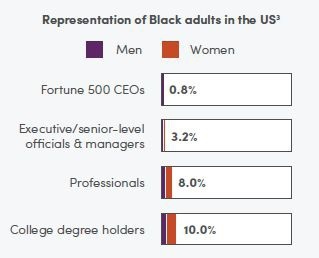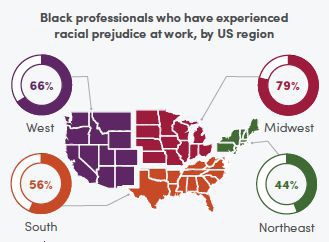Corporate shutout: Black professionals face prejudice and exclusion in America
By Michael Z. Muhammad -Contributing Writer- | Last updated: Jan 8, 2020 - 1:05:05 PMWhat's your opinion on this article?
And the beat goes on. A new study released by the Center for Talent Innovation entitled “Being Black in Corporate America: An Intersectional Exploration” paints a dim picture for Black advancement in the corporate world.
Currently, in the so-called C Suites, there are only four Black CEOs at Fortune 500 companies, and none of them are women. The study provides the reason why—racism, that old ugly word that haunts Black ambition in integrated White America.

|
According to the study, the tricks deployed to stunt Black success in the corporate world include denial on the part of White people who say, “There is too much attention paid to race and racial issues these days.” There is also a lack of a frank discussion about the merits of inclusion and allowing the system of privilege to continue. In human resources and diversity and inclusion strategies, Black professionals are frequently conflated with all “people of color.”
Michael Bush, CEO of Great Place To Work, states, “Black people lost ground when ‘of color’ became the popular thing to say.”

|
When it comes to racial prejudice, a majority of Black professionals reported such behavior in all of its subtleties. It hides in microaggressions in brief everyday exchanges that send denigrating messages, the study continues. Categories of these microaggressions include: microinsults, microinvalidations and microassaults. Blacks being told that they are “articulate,” not like “others” of their race, being miscategorized as “angry,” having their hair touched without permission, colleagues using racially insensitive language and being passed over or excluded from advancement opportunities are just a few of the microaggressions the report lays out.
The study also points to the significant beneficiary of the corporate diversity push—White women—and they are no ally of the Black professional.
Black professionals also report having to work harder than their White counterparts and are more ambitious. In many ways, Black professionals have two jobs, according to a recent article published in Fortune: “an official one, managing a team or division, and the other, ‘representing’ other African Americans who have yet to make it into the room.”
“Many of these Black professionals, for example, spoke of having to constantly calibrate their public miens: striving to appear focused at the office but not too aggressive; hungry but not threatening; well dressed but not showy; talented but not too damn talented,” the article states.
The Center for Talent Innovation study quotes one Black woman who stated: “A single mother raised me, and she would always say don’t be late, don’t bring your problems to work, dress a certain way. Because we are Black, you have to work harder.”
Part of the reason we don’t see more Black CEOs, writes Fortune‘s Ellen McGirt, is that “companies tend to do a poor job identifying and developing their young, Black talent.” The more subtle aspects of workplace politics— like the bonding that happens outside of the office—can also be more complicated for African Americans, psychologist and leadership consultant Dr. Lawrence James, Jr. told McGirt.
For Skip Spriggs, president and CEO of the Executive Leadership Council and a partner in the study, the problem is not a talent issue but an access issue. In an October story published in Black Enterprise, he said, “Currently, there are four black Fortune 500 CEOs versus seven less than a decade ago. Moreover, not a single Black woman helms a Fortune 500 or S&P 500 corporation permanently.”
“There are qualified and overqualified Black managers who can fill these positions,” he maintains. “This is not a talent issue but an access issue.” His solution is the development of leadership succession plans within corporate America.
A South Florida-based MBA and former president of the local National Black MBA Association, who wished to remain anonymous, told The Final Call in a telephone interview, he has 20 years of experience in the corporate world and is currently the only Black male in a 250 person department. “What I have faced is called unconscious bias,” he said. “This White privilege is so ingrained that White people don’t even realize they have privilege. You have to constantly educate because of their lack of insight. I am constantly asked how I obtained my position as though I’m unqualified.”
When asked if he thinks it is harder for him being forced to navigate different sets of expectations, he was blunt. “Yes. But you are used to putting in the extra work. That after a while it becomes standard operating procedure. Lastly you feel the burden of doing well and making it easier for the next Black person to get an opportunity. It’s a shame you have that burden but it’s there.”
Philadelphia Urban League president Andrea Custis has worked for corporate America for over 30 years she told The Final Call. “I am a Verizon past president. Do I believe racism exist in corporate America absolutely. Does it exist in America absolutely. It’s not hidden. It’s a fact,” she said.
However Ms. Custis said when looking at her three decades of experience and what’s happening today, she sees corporate America has made “significant improvement.”
She said there are more Blacks on company boards and upper level positions and that she sees more Blacks getting contracts in procurement than years ago.
In terms of solutions, the Center for Talent Innovation study calls for leaders to audit their workplaces, and create conversations that rouse White employees to the workplace prejudice that their Black colleagues face.
Black millennials are saying they can no longer tolerate this racial insanity and are leaving the corporate world to start their own businesses or work for smaller companies where their talents can be more appreciated, the study documents. They may finally be the generation that says “enough.”
The Fortune story points out this is also true of Black women. “They aren’t just missing from the Fortune 500,” according to a report released last March by the American Association of University Women. “African-American women made up just 1.5% of senior-level executives in the private sector in 2014. They account for about 6% of the U.S. population,” according to research firm Catalyst.
Yusef Ali, who worked for Armstrong World Industries for 20 years in upper management, sat down with The Final Call to discuss the study. He states the report is accurate in many ways. Mr. Ali said his key to success in corporate America was his ability to cultivate a mentor within the company to advocate for him and clear his path.
“I was one of the highest-ranking Blacks in management during my time with them. Having been a member of the Nation of Islam gave me insights many other Black employees didn’t have. I credit it for my success. I had no fear of White people,” said Mr. Ali.
“I was given their highest award as a sales executive, but I still hit that glass ceiling. I wasn’t promoted as I should have been because of racism. If I had fallen off the corporate ladder, I would not have broken an ankle,” he added.
INSIDE STORIES AND REVIEWS
-
-
About Harriett ... and the Negro Hollywood Road Show
By Rabiah Muhammad, Guest Columnist » Full Story -
Skepticism greets Jay-Z, NFL talk of inspiring change
By Bryan 18X Crawford and Richard B. Muhammad The Final Call Newspaper @TheFinalCall » Full Story -
The painful problem of Black girls and suicide
By Charlene Muhammad -National Correspondent- » Full Story -
Exploitation of Innocence - Report: Perceptions, policies hurting Black girls
By Charlene Muhammad -National Correspondent- » Full Story -
Big Ballin: Big ideas fuel a father’s Big Baller Brand and brash business sense
By Bryan Crawford -Contributing Writer- » Full Story






 Click Here Stay Connected!
Click Here Stay Connected!








